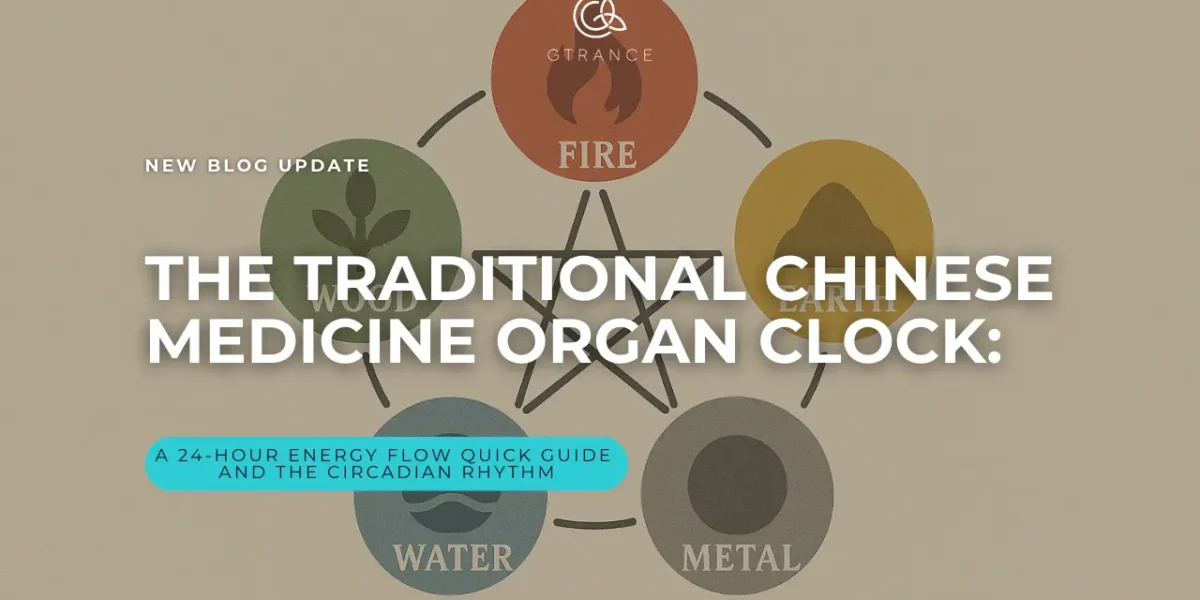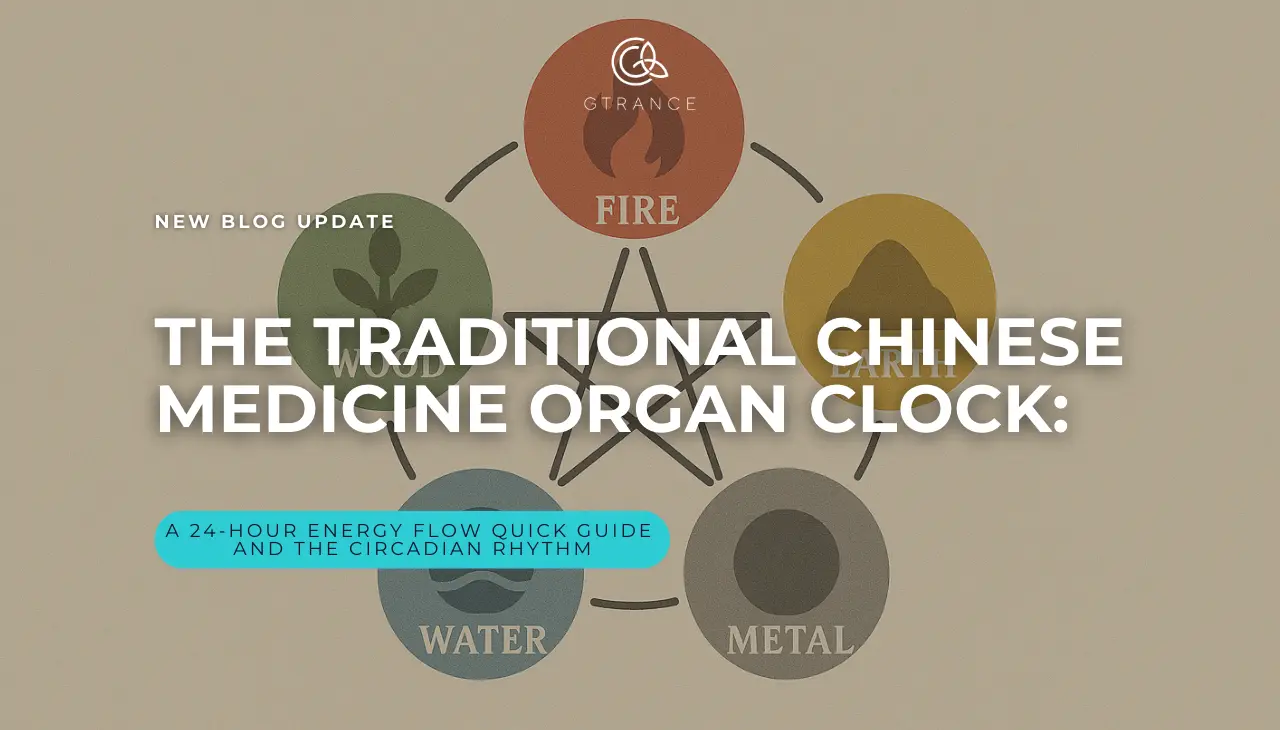
As a Doctor of Natural Medicine, I often remind my clients that health is not just about what we eat or the supplements we take, it is about how well we honor the natural rhythms of our body. For centuries, Traditional Chinese Medicine (TCM) has mapped out an intricate system known as the Chinese Body Clock, which shows how each organ operates at peak activity during a specific two-hour window.
Interestingly, modern science confirms much of this: our body runs on a circadian rhythm, regulating hormones, metabolism, sleep, and energy. By aligning our lifestyle with these natural cycles, we can improve digestion, sleep, mood, and overall vitality.
Here’s a breakdown of the Chinese Body Clock, and how you can harmonize with it in a way that makes sense for our modern lives.
3:00 AM – 5:00 AM: Lung Meridian
- Role: In TCM, the lungs are linked to respiration, oxygen exchange, and cleansing. Science supports this: oxygenation in the early morning sets the tone for energy levels throughout the day.
- Practical Tips: Rise early if you can. Practice deep breathing, gentle stretching, or meditation to expand lung capacity and set a calm, grounded mindset.
5:00 AM – 7:00 AM: Large Intestine Meridian
- Role: This is the body’s natural elimination time. Your digestive system is primed to clear toxins and waste.
- Practical Tips: Drink warm water or herbal tea first thing in the morning. Emotionally, let go of mental clutter, journaling or mindfulness can help.
7:00 AM – 9:00 AM: Stomach Meridian
- Role: The body is ready to receive nourishment, making this the optimal time for breakfast.
- Practical Tips: Choose a warm, nutrient-rich meal with protein and whole food to fuel your day. Avoid skipping breakfast, as it disrupts energy and metabolism (look for my article on the benefits of the Circadian Intermittent Fasting coming up soon).
9:00 AM – 11:00 AM: Spleen Meridian
- Role: The spleen (in TCM, related to digestion and energy) transforms food into usable energy. Modern parallels include blood sugar regulation and cognitive sharpness.
- Practical Tips: Use this high-energy window for focused work or problem-solving. Stick to balanced meals, avoiding processed sugars that cause energy crashes.
11:00 AM – 1:00 PM: Heart Meridian
- Role: The heart governs circulation and emotional balance. Around midday, cardiovascular function is strong.
- Practical Tips: Take time for a mindful lunch. A short walk following lunch helps circulation and boosts focus.
1:00 PM – 3:00 PM: Small Intestine Meridian
- Role: Nutrient absorption is emphasized here. Many people also notice a post-lunch dip in energy.
- Practical Tips: Avoid overexertion. A light walk, stretching, or gentle tasks help your body process food without strain.
3:00 PM – 5:00 PM: Bladder Meridian
- Role: In TCM, the bladder supports fluid balance. In modern terms, this is a period of renewed focus and productivity.
- Practical Tips: Stay hydrated. Use this time for mentally demanding work or exercise. You will likely find your energy and concentration peak.
5:00 PM – 7:00 PM: Kidney Meridian
- Role: The kidneys store life force (Jing, Prana, Qi) and support endurance. Scientifically, this correlates to the body’s natural “second wind.”
- Practical Tips: Choose restorative activities such as yoga, stretching, or a light dinner. Avoid stimulants like caffeine that can disrupt evening calm.
9:00 PM – 11:00 PM: Pericardium Meridian
- Role: Associated with emotional balance and preparing the body for rest. Modern sleep science also shows this as the transition time into deeper rest states.
- Practical Tips: Wind down with reading, journaling, or meditation. Limit screen time to support melatonin release.
11:00 PM – 1:00 AM: Triple Burner Meridian
- Role: This system regulates metabolism and internal balance. During these hours, the body shifts into repair and regeneration.
- Practical Tips: Be asleep now to maximize healing, immune function, and hormone balance.
1:00 AM – 3:00 AM: Liver Meridian
- Role: The liver detoxifies and processes emotions. Modern science agrees that liver detox pathways are most active at night.
- Practical Tips: Deep, restful sleep is essential. Avoid alcohol and heavy night-time meals, which interfere with detoxification.
Practical Ways to Live by the Body Clock
Whether or not you are immersed in Chinese Medicine, the wisdom of aligning with your body’s natural timing is universal. Here are simple ways to apply it daily:
- Keep a Consistent Sleep-Wake Schedule: Your organs thrive on predictability.
- Eat in Sync with the Clock: Prioritize breakfast and lunch as main meals; keep dinner lighter.
- Pay Attention to Energy Patterns: Notice when you feel sharp, tired, or emotional. Listen to the signals your body is always sending.
- Seek Natural Light: Get morning sunlight for circadian regulation, and dim lights in the evening.
- Practice Mind-Body Medicine: Breathwork, yoga, meditation, and Qigong are wonderful tools to synchronize your energy.
The Chinese Body Clock is more than an ancient theory; it’s a reminder that our body is deeply intelligent and wired for rhythm. When we respect these natural cycles, we restore energy, improve sleep, balance emotions, and unlock a deeper sense of vitality.
In my natural medicine practice, I encourage clients to experiment with this rhythm and notice the shifts in their body and mind. Often, small lifestyle changes such as eating earlier, sleeping deeper, breathing slower bring profound healing.
Your body already knows the way back to balance. The clock is simply guiding you home.
©2025 Grace El Tayar
